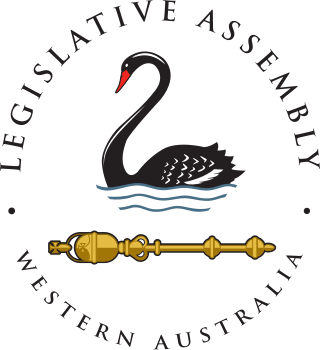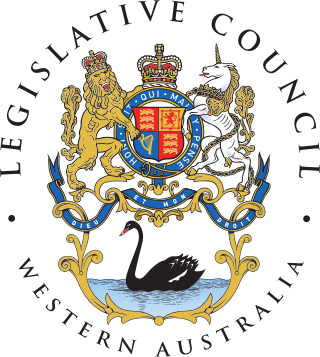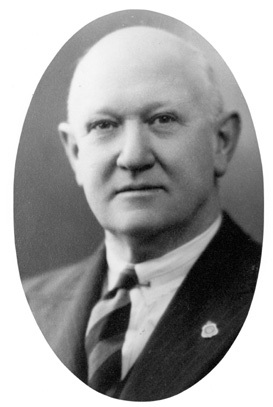Related Research Articles

The Western Australian Legislative Assembly, or lower house, is one of the two chambers of the Parliament of Western Australia, an Australian state. The Parliament sits in Parliament House in the Western Australian capital, Perth.

The Western Australian Legislative Council is the upper house of the Parliament of Western Australia, a state of Australia. It is regarded as a house of review for legislation passed by the Legislative Assembly, the lower house. The two Houses of Parliament sit in Parliament House in the state capital, Perth.

The Division of O'Connor is an Australian electoral division in the state of Western Australia. It is one of Western Australia's three rural seats, and one of the largest electoral constituencies in the world.
Roe is an electoral district of the Legislative Assembly of Western Australia. It takes in rural areas in the south of the state. Roe was re-created for the 2017 state election, having previously been in existence from 1950 to 1983 and from 1989 to 2008. It had a notional 16.7-point majority for the National Party against the Liberal Party, based on the results of the 2013 state election.
Wagin was an electoral district of the Legislative Assembly of Western Australia. It was in existence from 1911 to 1950 and from 1989 to 2017. The seat was named after the town of Wagin and incorporated portions of the Wheatbelt, albeit with varying boundaries. Wagin was a safe seat for the National Party for most of its existence.

The Shire of Kondinin is a local government area in the eastern Wheatbelt region of Western Australia, about 300 kilometres (186 mi) east of the state capital, Perth. The Shire's land area of 7,376 square kilometres (2,848 sq mi) forms a narrow east-west band, located between the Shire of Narembeen to the north and the Shire of Kulin to the south. Its seat of government is the town of Kondinin.
The Western Australian National Party, officially known as the National Party of Australia (WA) Inc, and branded as Nationals WA, is a political party in Western Australia. It is affiliated with the National Party of Australia, but maintains a separate structure and identity. Since the 2021 state election, the Nationals have been the senior party in an opposition alliance with the WA Liberal Party in the state parliament.
Elections were held in the state of Western Australia on 21 October 1914 to elect 50 members to the Western Australian Legislative Assembly. The Labor party, led by Premier John Scaddan, retained government against the opposition conservative Liberal Party led by Opposition Leader Frank Wilson, though with only the barest of majorities. The election also saw the emergence of the Western Australian Country Party, which had been formed at a conference of the Farmers and Settlers Association the previous year to fight for rural interests, and won eight seats at the election.
This is a list of members of the Western Australian Legislative Assembly from 1965 to 1968:

Elections were held in the state of Western Australia on 14 February 1953 to elect all 50 members to the Legislative Assembly. The two-term Liberal-Country Party coalition government, led by Premier Sir Ross McLarty, was defeated by the Labor Party, led by Opposition Leader Albert Hawke.

Elections were held in the state of Western Australia on 25 March 1950 to elect all 50 members to the Legislative Assembly. The Liberal-Country coalition government, led by Premier Ross McLarty, won a second term in office against the Labor Party, led by Opposition Leader Frank Wise.
The 1967 Mount Marshall state by-election was a by-election held on 2 September 1967 for the Western Australian Legislative Assembly seat of Mount Marshall in the northeastern agricultural part of the state.
Martin Aldridge is an Australian politician. He is a member of The Nationals WA and serves as a Member for the Agricultural region in the Western Australian Legislative Council.

A by-election for the seat of Katanning in the Western Australian Legislative Assembly was held on 31 August 1935, following the death of the sitting member, Arnold Piesse of the Country Party. Six candidates contested the election, including three endorsed Country candidates. Neither of the two other major parties, Labor and the Nationalists, fielded candidates. The campaign focused mainly on local issues, and no candidate received more than a quarter of the vote. With preferential voting in use, endorsed Country Party candidate Arthur Watts was elected over unendorsed Country Party candidate Nelson Lemmon after five rounds of counting, beginning Watts' 27-year career in the Legislative Assembly.
Aloysius Joseph "Loy" Rodoreda was an Australian politician who was the Speaker of the Legislative Assembly of Western Australia from 1953 to 1956. A member of the Labor Party, he sat in parliament from 1933 to his death in 1958, first representing Roebourne and then Pilbara, both located in the state's North-West.
Morton William "Mort" Schell is an Australian former politician who was a National Party member of the Legislative Assembly of Western Australia between 1986 and 1989, representing the seat of Mount Marshall.
William Gordon Young was an Australian politician who was a Country Party member of the Legislative Assembly of Western Australia between 1967 and 1974, representing the seat of Roe.
Geoffrey Royden "Geoff" Grewar is a former Australian politician who was a Liberal Party member of the Legislative Assembly of Western Australia from 1974 to 1983, representing the seat of Roe.
Thomas George Hart was an Australian farmer and politician who was a Country Party member of the Legislative Assembly of Western Australia from 1962 to 1967, representing the seat of Roe.
Thomas Knight was an Australian politician who was a Liberal Party member of the Legislative Council of Western Australia from 1974 to 1986, representing South Province.
References
- ↑ "Electoral Act 1907–1964: Roe Electoral District By-Election: Polling Places". Western Australia Government Gazette. 2 August 1967. p. 1967:1909.
- ↑ Black, David; Prescott, Valerie (1997). Election statistics, Legislative Assembly of Western Australia, 1890-1996. Perth: Parliamentary History Project and Western Australian Electoral Commission. p. 296. ISBN 0-7309-8409-5.